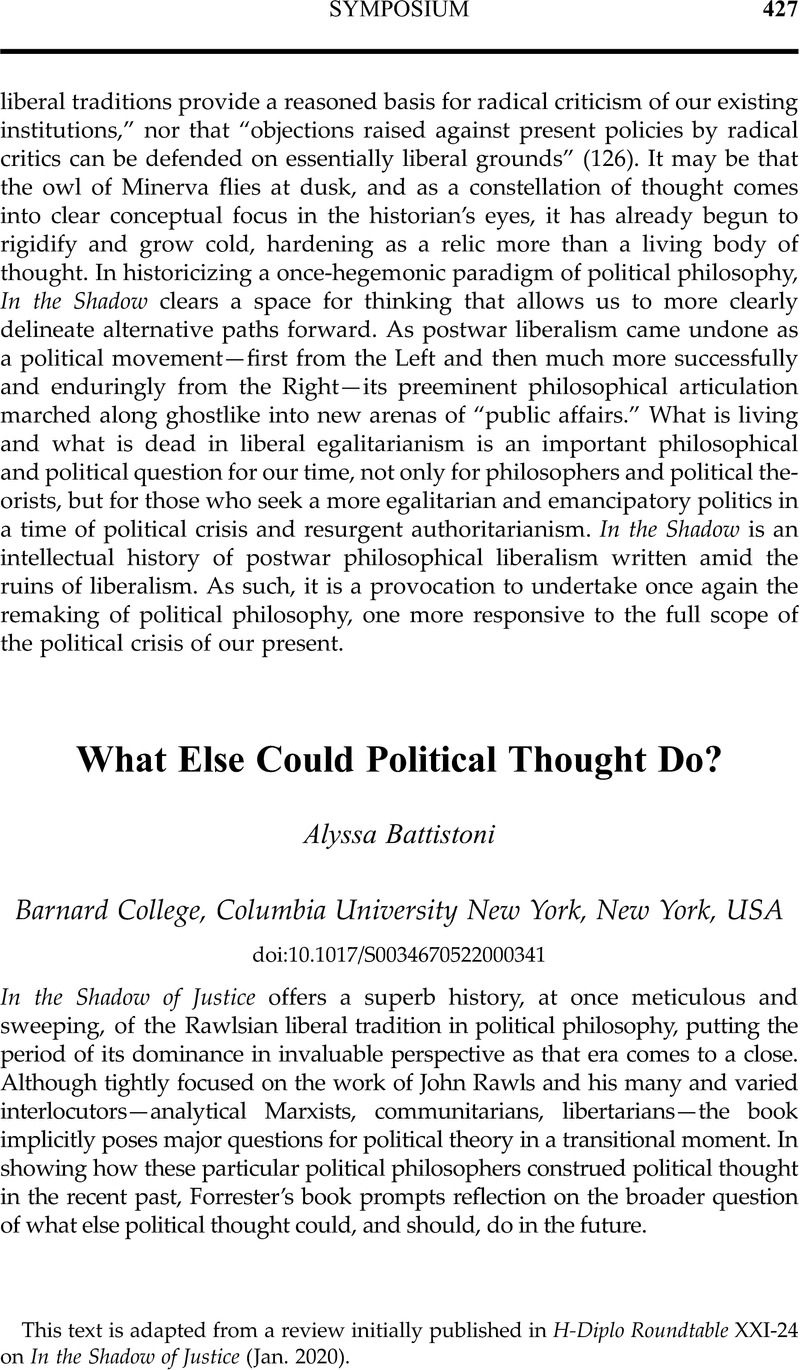No CrossRef data available.
Article contents
What Else Could Political Thought Do? - Katrina Forrester: In the Shadow of Justice: Postwar Liberalism and the Remaking of Political Philosophy. (Princeton, NJ: Princeton University Press, 2019. Pp. 432.)
Review products
Published online by Cambridge University Press: 18 July 2022
Abstract

- Type
- A Symposium on Katrina Forrester's In the Shadow of Justice: Postwar Liberalism and the Remaking of Political Philosophy
- Information
- Copyright
- Copyright © The Author(s), 2022. Published by Cambridge University Press on behalf of University of Notre Dame
Footnotes
This text is adapted from a review initially published in H-Diplo Roundtable XXI-24 on In the Shadow of Justice (Jan. 2020).
References
1 Smith, Sophie, Bejan, Teresa M., and Zimmermann, Annette, “The Historical Rawls: Introduction,” Modern Intellectual History 18, no. 4 (2021): 899–905Google Scholar.
2 Sophie Smith, “Historicizing Rawls,” Modern Intellectual History 18, no. 4 (Dec. 2021): 1–34; Angus Burgin, review of In the Shadow of Justice, H-Diplo Roundtable XXI-24 (Jan. 2020).
3 Raymond Geuss, Philosophy and Real Politics (Princeton, NJ: Princeton University Press, 2008).
4 Cf. Robert Bullard, ed., The Quest for Environmental Justice: Human Rights and the Politics of Pollution (San Francisco: Sierra Club Books, 2005).
5 David Schlosberg, Defining Environmental Justice: Theories, Movements, and Nature (Oxford: Oxford University Press, 2007).
6 Olúfẹ́mi O. Táíwò, Reconsidering Reparations (Oxford: Oxford University Press, 2022), for example, engages Rawlsian justice briefly on the way to making a novel argument for reparations.
7 Karuna Mantena, “Another Realism: The Politics of Gandhian Nonviolence,” American Political Science Review 106, no. 2 (2012): 455–70; Erin Pineda, Seeing Like an Activist: Civil Disobedience and the Civil Rights Movement (Oxford: Oxford University Press, 2021). Mie Inouye, “Starting with People Where They Are: Ella Baker's Theory of Political Organizing,” American Political Science Review 116, no. 2 (2022): 533–546; Tommie Shelby and Brandon M. Terry, eds., To Shape a New World: Essays on the Political Philosophy of Martin Luther King, Jr. (Harvard University Press, 2018).
8 Haraway, Donna, “‘Situated Knowledges,’ the Science Question in Feminism and the Privilege of Partial Perspective,” Feminist Studies 14, no. 3 (1988): 575–99CrossRefGoogle Scholar.


